- Home
- Roger Smith
Nowhere Page 6
Nowhere Read online
Page 6
“Fuck.”
“Ja.”
“And English? Where’d you learn that?”
“Books. Cheap paperbacks. Mostly crime stuff. Probably why I became a cop. And you?”
“Mission school in KwaZulu. The Catholic bastards beat any belief in god out of me but they taught me the Queen’s English.”
“Did you a favor with the god stuff.”
“Fuckin right. Life’s confusing enough without that shit.”
“Amen.”
They both laughed then Zondi scratched his neatly pruned head and said, “So, bring me up to speed on this Kruger thing.”
“You read my report.”
“I want to hear it from you.”
“Ja?”
“Ja.”
“You’re a pain in the ass.”
“Yes, I am,” Zondi said.
Assegaai shrugged. “Okay, two months ago the owner of the farm that neighbors Witsand was murdered. Name of George Maritz. Shot in his house which was ransacked, some stuff stolen. His wife and kid were away, so he was the only victim. We couldn’t find shit. You know how common these farm murders are? Thing is, Maritz was a good guy. Treated his workers well, gave them decent housing, set up a school on the farm. Jesus, compared to a lot of those guys he was a saint. So not an obvious target.”
Zondi sat and watched the small man, saying nothing.
“Then three weeks after that a body was found out near the shack settlement. Black kid. Local. A petty criminal. Tshepang Moshweng. Shot five times. We sent the bullets—.38s—off to Cape Town to ballistics, but didn’t hold out much hope. We searched his shack and found a cell phone and a TV belonging to Maritz. Maybe he stole them or maybe he fenced them. Then a few weeks after we had a report of a car accident and we went out and found Magnus Kruger’s truck off the road, rolled. He wasn’t there. He was drunk, probably. Rolled the thing and got the hell out of there. But we found a pistol in the glove box, a .38, and sent it on to Cape Town. Just in case. Heard nothing back and I checked and they said it had been lost. Happens all the time. You know how it goes.”
“Ja, I know. Lost or paid to be lost.”
“But it then it turned up.”
“Yeah?”
“Ja. Out of the blue we got a call yesterday that it had been found. That the bullets matched those in Tshepang’s body. That’s it.”
“So what’s your take?”
“Tshepang killed Maritz. Kruger and his men, pissed off that the law was doing nothing, took him out. Kruger, stupidly or arrogantly, held onto the gun. After the accident he bribed the forensics guys.”
“But the gun turned up?”
“Ja, I know. Weird.”
“It sounds too convenient,” Zondi said.
“Still . . .”
“Ja, I’ll take it.” He scratched his head again. “So, all pretty simple, really.”
“Ja, stupid fuckers doing stupid fuckin things,” Assegaai said.
“No shortage of stupid fuckers.”
“No.”
“Story of this country.”
Assegaai blew a smoke ring and watched it disperse, then he stubbed out his cigarette and stood.
“I’m going now.”
“Where to?”
“To drink until I fall down.”
“That’s your thing?”
“One of them. Shuts up the ghosts in my head who talk to me in too many fuckin languages.”
“Good luck with that.”
“You gonna be okay?”
“Sure.”
Assegaai paused in the doorway. “That fat pig in there . . .” Jerking his head at the cell.
“Ja?”
“Maybe you take him some coffee or some shit paper and he jumps you and you have to plug him. Nobody would blame you.”
“It’s tempting.”
“So?”
Zondi shook his head. “I’m just not wired that way.”
“Okay.”
“Okay.”
He was gone, leaving Zondi alone with his own ghosts.
FOURTEEN
Steve Bungu didn’t sleep. Okay, maybe that was a fuckin exaggeration, but he didn’t sleep like other people did. No getting into bed and slipping into a slumber for six or eight hours and then waking up in time for breakfast.
No fuckin way.
Sleep was the place of memory.
Sleep was the vault in which all the pain that had been inflicted on him was stashed and each day it gathered interest and grew just that bit more painful, just that bit more impossible to bear.
So time, for Steve Bungu, was not a healer.
Time, though it took him farther each day from the events that had left him scarred and arthritic and psychologically tormented, was a lens that magnified all that had been done to him and he understood that one day—who knew when?—it would be too much and he’d swallow the barrel of his .45 and put an end to it all.
He’d tried booze. It’d done nothing. Well, it had dulled things and made him slur and fucked with his already impaired motor skills, but it had done nothing to ease his pain. If anything, it had left him acutely aware of what ailed him.
He’d tried pills. The same. They’d made him sluggish and he’d driven his car off a bridge once and into a dry riverbed and had been taken to hospital with a broken leg and cracked ribs.
More fuckin pain.
Jesus.
So, no booze.
No pills.
What helped, a little, he found, what eased him for a while, was some time with one of the brown hookers who haunted the streets of Sea Point.
So he was in his SUV driving down Main Road, on the lookout for both the girls and the cops who sometimes harassed them and their johns. If he got stopped he’d flash the badge that ID’d him as part of the president’s protection squad, but who needed the fuckin hassle?
And there it was, a white cop van, a couple of uniforms on the sidewalk talking to the girls. They’d collect kickbacks in the form of money or favors and be gone in a while, so he hung a right at the Sea Point Evangelical Church and drove down to Beach Road.
Drove a mere city block but entered a different world as he neared the street that snaked along the ocean. If Main Road with its hookers and meth houses was all Lagos, then these glitzy apartment blocks were all Saint-Tropez.
The light at Beach Road caught him and he looked down the ramp to the underground car park of a luxury apartment building and his memory, sharp as a blade, drew him back to the evening thirty years ago when Bungu, twenty-seven years old, returning from a meeting with struggle activists—these were still the peaceful days, the days of protest marches and prayer vigils, before he had found his talent for the gun and the bomb—had driven down that ramp and parked his borrowed Toyota Corolla amidst the Porches, Bimmers and Benzes beneath the exclusive Sea Point building, a building reeking of old Cape Town money. He’d come in too close to a silver Daimler and had to squeeze his bulk out the Toyota’s door, careful not to chip the paint of the gleaming limo.
The son of a farm worker from the Transkei he was unused to wealth and its trappings, and he felt like a sell-out, even though he and Nandi were in hiding here, on the run from the security police, given refuge by a Human Rights lawyer and his wife, rich Jews who for years had supported the Anti-Apartheid movement.
Bungu stepped into the mirrored elevator, confronted by a tribe of chunky Xhosa men in designer suits. An embarrassment, this ink-blue outfit, the lawyer’s wife—Monica Segal—taking his awkward measurements and then bringing him this bespoke silk suit a few days later, the idea for him to look like one of the emerging black middle class (the real sell-outs) who were known to hobnob in these buildings with white liberals. His was not the kind of body to squeeze into an outfit designed for square shoulders and washboard abs.
The elevator chimed politely and the doors whispered open and he was confronted with a view so alien that it still numbed him after a week: the Atlantic Ocean, lying as flat as a mirror, th
e blue of the water bleeding into a pink and orange sunset. Robben Island—where Nelson Mandela had been held for nearly thirty years—breaking the horizon, its lighthouse strobing in the fading light.
Bungu had grown up in the Transkei, yes, but in a town far from the coast, and had seen the ocean for the first time when he was a teenager and it had terrified him in its uncontained vastness. While his school friends had splashed and cavorted he’d paddled close to the shore, battling his fear that this endless water would seize him and drag him away into nothing.
Moving to Cape Town he’d found a life in the cramped ghetto of Gugulethu, the ocean a distant dream.
He arrived at the door to their patrons’ apartment. A blond door, tall and wide, with a gleaming silver handle and a mezuzah on the doorframe. He unlocked the door, the tumblers turning silently, pushed it open and stepped into the living room, Scandinavian furniture strewn across a wooden floor that wouldn’t have shamed a dance hall. Floor to ceiling windows offered a panorama that swept from the edge of Table Mountain to the endless Atlantic.
The room was so big and the view so obtrusive that it took him a moment to see Nandi in a T-shirt and jeans, lying in the gloom on a huge sofa that squatted by one of the windows.
He couldn’t see her face, but his memory painted in her features.
His wife’s beauty always astonished him. Left him amazed that a poorly-made man like him could have ended up with a woman this gorgeous. Nandi kept her hair short—no ironing or extensions for her—showing off her long neck. Her cheekbones were high, her lips full, her skin the color of bronze.
When the security policemen turned on the light he saw that Nandi’s wrists and ankles had been tied, her mouth gagged, and her T-shirt was torn and there was a streak of blood on her face, and her eyes—huge eyes, always dancing with life—were filled with anger.
Saw too the bodies of their protectors, Hilton and Monica Segal. Throats cut, blood sprayed across the Matisse still life that Monica had inherited from her grandmother who had fled Nazi Germany with the canvas rolled up under her coat.
Bungu’d had the satisfaction of punching one of the white bastards, breaking his nose, before the others had fallen upon him and beaten him unconscious. His last view had been Nandi trying to fight her way off the couch, trying to fight her way to him.
The light was green and driver of the car behind was leaning on his horn and Bungu hit the gas and turned right into Beach Road, drove under the palm trees for a few blocks and went back up Glengariff and saw a young woman standing beneath a jacaranda opposite the 7-Eleven, smoking as she eyeballed the passing cars.
He’d never picked her up before, which was cool, he liked fresh starts.
Bungu stopped beside her and she gave him a smile about as sincere as an investment banker’s as she dropped her cigarette and reached for the BMW’s door. The dome light clicked on, flaring off his pitted skull, and she clocked Bungu and hesitated a moment, then she swung herself up, all short skirt and ridiculous platform shoes, her painted toes peeping out like fries dipped in ketchup.
“Hey,” she said as she settled in her seat and closed the door, “I’ve been waiting for my bedtime story.”
Bungu didn’t drive away, just looked at her.
“What do you mean?”
She laughed. “I’ve heard about you, man.”
“What have you heard?”
“Black guy. Ugly.” She shrugged. “Sorry.”
“Don’t be. It’s true. Go on.”
“Picks up the girls and doesn’t want to fuck or get sucked just wants to park by the beach and talk about some shit happened to him long ago.”
“What shit?”
“Dunno. Those chicks, their brains are so fuckin fried they can’t remember fuck all.” She looked at him. “So let’s go, man.”
He shook his head. She was too alert, this one. A user, for sure—he could smell the tik on her—but not as wasted and oblivious as he was accustomed to.
Or needed.
“You’d better go,” Bungu said.
“For real?”
He slipped her a fifty. “Ja. Sorry I wasted your time.”
The hooker grabbed the note. “Suit yourself,” she said and quit the car.
Bungu started the BMW and drove into the night, his head aching with memories.
FIFTEEN
Disaster Zondi stood at the rear of the small courtroom and watched the unfolding of the inevitable.
Magnus Kruger sat in the dock, impassive, eyes on the Tswana magistrate, a nervous man in late middle-age clearly more used to performing marriages or dealing with drunks and petty thieves and malcontents.
The gallery was packed with men in khaki rubbing shoulders uncomfortably with some of the local black populace. A malnourished looking woman in a headscarf, wearing a woolen cardigan too hot for the day and an ill-fitting blue dress sat staring at Kruger with a look of mute sorrow. She would have to be the mother of the dead youth.
When Kruger was asked to plead he rose and said, “Not guilty,” with a warble of righteous indignation.
The prosecutor, a young mixed-race woman from Kimberley, did a good job of presenting the facts at hand and asked that Kruger be remanded in custody.
Kruger’s lawyer, a bloodless creature in an expensive suit who looked as if he’d harvest the organs of his own children, argued that his client was hardly a flight risk and should be granted bail.
The magistrate agreed and set bond at fifty-thousand rand.
There were loud cheers in Afrikaans and Kruger strode from the courtroom, followed by his brownshirts.
More of his followers were gathered on the steps of the courthouse, as were a clutch of media second-stringers, those low enough down on the totem pole to be spared from the circus in Cape Town.
Zondi, moving behind Kruger, saw a skinny young man flash a stiff armed salute, the harsh sun catching the tattoo of the swastika on his hand.
The man was in his early twenties, better looking than his white trash brethren, with an aura about him. That indefinable aura of trouble.
Zondi lost sight of him when Kruger stopped at the top of the steps and, tellingly, addressed the crowd in English.
“The Boer people are being attacked, tortured, raped, maimed and murdered on a daily basis. There are laws preventing us from finding jobs. Our farms are being taken in a government sanctioned land grab, our statues are being defaced and removed, our monuments neglected, our language sidelined and the names of our cities and streets changed. All this in an effort to eradicate our culture. But, on top of this, our people are being murdered. White farmers are being murdered each and every day! This is a genocide! This is a war! And I am a prisoner of that war. But I will fight. I will fight for my people. My volk.”
Through the bellows of assent came the sound of a lone voice singing “Nkosi Sikelel' iAfrika”, the national anthem of post-Apartheid South Africa, in perfect Xhosa and Zondi turned to see a young white woman dressed in a Voortrekker dress, blonde hair almost hidden by a bonnet, her feet dusty and bare, incongruously wielding a selfie stick as she advanced through the crowd that parted before her like the waters of the Red Sea.
Magnus Kruger fell silent, staring at her as she climbed the steps, the anthem reaching its crescendo. When she finished singing she stretched out a hand and laid it on his shoulder and said, “Hullo, Pappa.”
Kruger paled and stuttered and clutched at his chest, coughing, and pissed his khaki pants as he collapsed to the filthy concrete steps.
SIXTEEN
Sue Kruger—Susanna Magdalena Kruger, named after both her grandmothers—dressed now in faded Levis the color of her eyes and an old Gap T-shirt (the Voortrekker dress folded away in the backpack at her feet) sat in the Nêrens Wimpy diner, oblivious to the stares and the whispers of the black and mixed-race staff in their red and white outfits, as she regarded the scummy skin on the surface of her cold, undrinkable coffee, and reflected, as she so often did, that she owed everything to he
r father, Magnus.
Owed to him the vertical scars on the underside of each forearm; owed to him the not quite faded lesions on her arms and legs that spoke of the years of heroin abuse that had begun in a squat in Amsterdam; owed to him the nervous tic, a blinking of her left eye and the stretching of the side of her mouth as if she were about to smile (although Sue Kruger seldom smiled) that got way worse if she went off the meds her psychiatrist prescribed for her.
And as she looked out the window at the dusty street—a Sasol gas station, a Pep outfitters, a boarded up Mr. Video, a heavily barred loan store—she said a silent litany of thanks to the man who had brought here her, to this place, made her who she was, the man who had already been discharged from the local clinic (the toll of stress, hypertension and alcoholism the cause of his media-worthy collapse, perhaps only slightly exacerbated by the unexpected return of his prodigal daughter) and sent home to his lair in the tragic little Boer homeland.
Thanks Daddy, dankie Pappie, for prompting the suicide attempts and the shrinks and the bouts in rehab and the merry-go-round of mental institutions.
Thanks for the legacy of the decades of sexual promiscuity—seeking out men who were dark of skin and darker of soul, fucking them to hurt her father but ending up hurting only herself.
Of course.
Christ, that’s how it went, didn’t it?
The sins of the fathers were visited upon the daughters just as much as the sons.
And she was a singleton, so the weight of those sins sat foursquare on her narrow shoulders.
Thank you, Dad.
Dankie Pappie.
Thanks for being such a sadistic, controlling, drunken, cheating, disgusting fascist bastard that you drove Mommy—the beautiful mommy Sue saw each day in the mirror—to put the barrel of the Mossberg shotgun in her mouth and pull the trigger with her toe of her right foot (that long, slightly crooked toe, just like Sue’s) and leave her brains across the wall and ceiling of the bedroom for Sue to find when she came back from the Dirkie Uys junior school, her brown Baby Doll Buccaneer’s squelching on the sodden rug, the sentimental rendering of the Voortrekker Monument lost in a swathe of her mommy’s blood and bone shards.

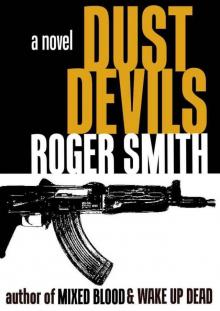 Dust Devils
Dust Devils![[2013] Sacrifices Read online](http://i1.bookreadfree.com/i/03/19/2013_sacrifices_preview.jpg) [2013] Sacrifices
[2013] Sacrifices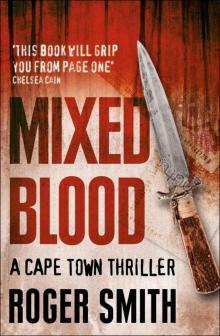 Mixed Blood
Mixed Blood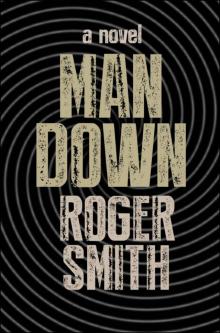 Man Down
Man Down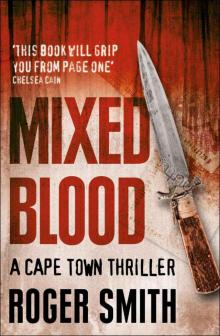 Mixed Blood ct-1
Mixed Blood ct-1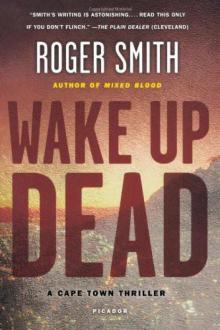 Wake Up Dead: A Thriller (Cape Town Thrillers)
Wake Up Dead: A Thriller (Cape Town Thrillers)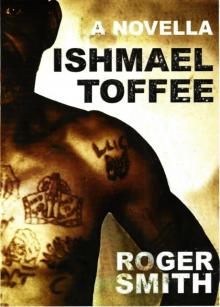 Ishmael Toffee
Ishmael Toffee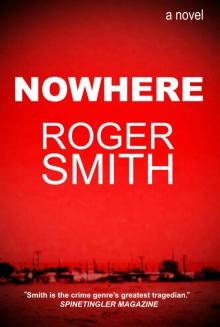 Nowhere
Nowhere Sacrifices
Sacrifices